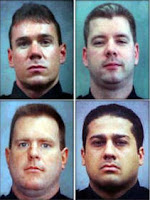 Abner Louima
Abner Louima NYPD Officers: Thomas Bruder, Thomas Weise, Justin Volpe, Charles Schwartz
NYPD Officers: Thomas Bruder, Thomas Weise, Justin Volpe, Charles Schwartz Club Rendezvous
Club RendezvousOn August 9, 1997 there was the case of Abner Louima. Louima was a Haitian male who was arrested at a night club in Brooklyn, New York after officer Volpe believed Louima punched him. Officers Volpe, Schwarz, Bruder, and Wiese beat Louima with their fists, nightclubs and radios before and while transporting him back to the precinct. At the 70th Brooklyn Precinct, the beating continued. Louima was strip searched and remained handcuffed while he was continually beaten, kicked in the testicles by officer Volpe, and sodomized by a plunger handle in the bathroom causing severe damage to Louima’s colon and bladder requiring several surgeries. Volpe also used the bloody plunger stick and shoved it in Louima’s mouth breaking several of his teeth as well.
In America there has been a history of police brutality with minorities ever since the slave patrols during the Colonial Era. Slave patrols consisted of law enforcement as well as vigilantes who would round up run away slaves and subject them to floggings, beatings, whips and hangings. However, even after slavery ended legalized racism did not. Minorities were still subjected to government enforced segregation such as Jim Crow laws and excluded from many normal civilian rights such as citizenship, voting, and property owning.
Many African Americans were terrorized, if not killed, by KKK members. Some of theses KKK members consisted of local law enforcement officers. During the Civil Rights Demonstrations in Selma, Alabama peaceful demonstrators were met by the police and subjected to unnecessary use of batons, tear gas, stampeding horses, and severe beatings. Who should minorities turn to when the people they are afraid of the most is the police?
Police officers are the only authorized occupation were the use of physical force is authorized. It is a job that gives a great deal of discretion. It is important that the people empowered to act as government enforcers have proper ethics and don’t give in to police corruption such as the police code of silence, taking bribes (however small they may be), using unethical interrogation techniques, and violating people’s human rights. Although some police officers may view themselves as crime fighters and view their job as the “good guys” versus the “bad guys,” it is important that everyone’s civil rights be upheld at all times. There are many gray areas as police officers so it’s important that moral ethics are sought after in recruitment practices.

No comments:
Post a Comment